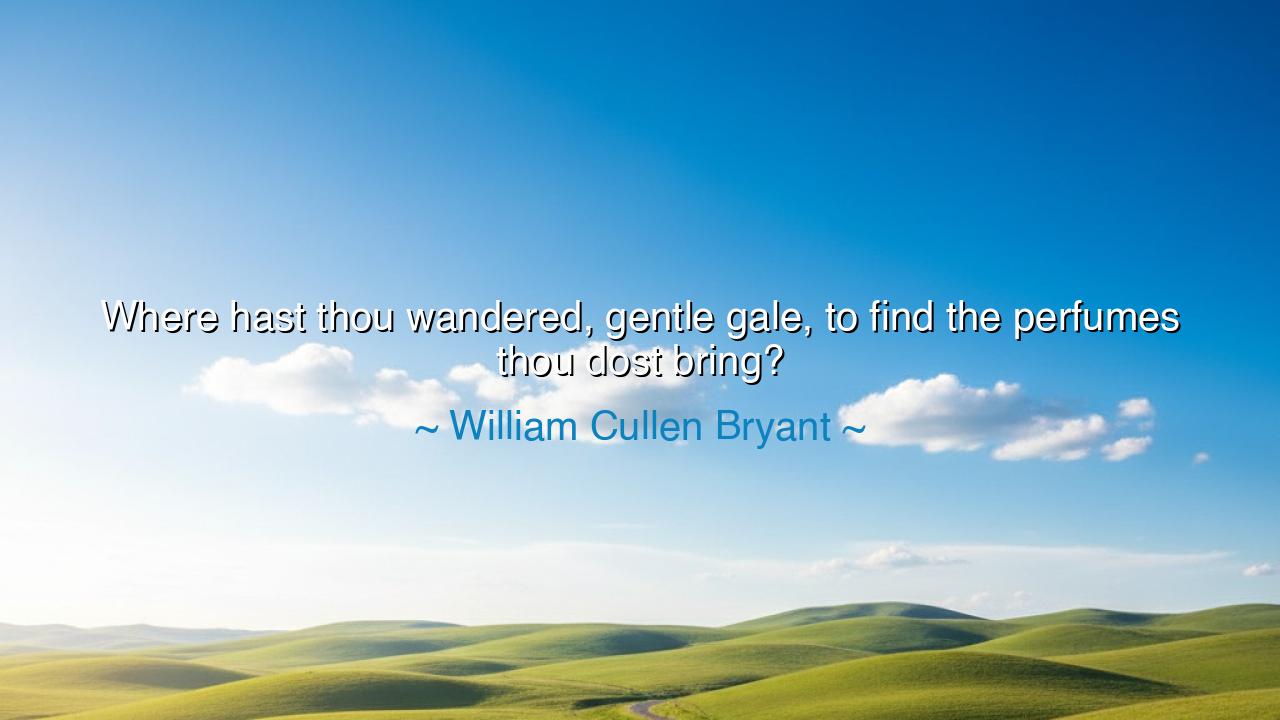
Where hast thou wandered, gentle gale, to find the perfumes thou






Listen, children of the ages, and hear the voice of William Cullen Bryant, who, with heart attuned to the whispers of the world, penned: "Where hast thou wandered, gentle gale, to find the perfumes thou dost bring?" Here lies a meditation on the subtle gifts of life, carried not by hand or treasure, but borne upon the winds of time and nature. The gale, soft and unassuming, traverses mountains, meadows, and seas, gathering in its invisible hands the scents, the whispers, and the essence of all it touches, only to offer them generously to those who pause and perceive. Bryant beckons us to wonder at the journey of beauty, to honor the unseen paths through which life’s blessings arrive.
In this gentle question, there is reverence for movement and exploration. The gale wanders without aim, yet its travels yield treasures beyond measure: the aroma of blooming flowers, the freshness of the sea, the earthy perfume of rain-soaked soil. Bryant marvels at the mystery of how such simple forces can carry such profound gifts, reminding us that often, the most precious things in life arrive without design, flowing naturally from the currents of existence.
Think of the historical travels of explorers and poets, who sought to understand the richness of the world. Marco Polo journeyed across deserts and mountains, bringing stories and spices back to his homeland. Bryant’s gale mirrors these wanderers: gathering wisdom, scents, and experiences from distant lands, and offering them to the world. In both nature and human endeavor, beauty and knowledge travel hidden pathways, arriving unexpectedly to those open to receive them.
Notice too the tone of wonder in Bryant’s words. He does not command the gale, nor claim ownership of the perfumes it carries. Instead, he questions, he marvels, he honors the mystery. In this lies a deeper truth: the gifts of life—whether insight, inspiration, or joy—cannot be manufactured, only received. Just as the gentle wind brings fragrance from unseen places, wisdom and beauty flow to those attuned to observation, patience, and presence.
Consider a real-life example: the work of Claude Monet, who wandered the gardens of Giverny, observing the play of light, color, and scent. He allowed his senses to wander, much like Bryant’s gale, and transformed these wanderings into masterpieces that captured the essence of nature itself. Monet’s vision reminds us that gifts—whether artistic, intellectual, or spiritual—are often gathered not by force, but through curiosity, attentiveness, and openness to the world’s quiet wonders.
The lesson is profound: cultivate a spirit like the gale, wandering with receptivity, gathering insights, impressions, and joys wherever you roam. And when blessings arrive—subtle, fragrant, transformative—receive them with gratitude, wonder, and reverence. Bryant’s line is a call to notice, to perceive, and to honor the journey of life’s quiet miracles.
Practical action flows naturally: step into the world with openness, walk through forests, gardens, and open fields, breathe deeply, and allow the senses to receive. Observe the small gifts—the scent of rain, the song of birds, the fragrance of flowers—that arrive unexpectedly. Let curiosity guide your wandering, for in attentive wandering lies the harvest of wisdom, beauty, and serenity.
Thus, Bryant’s gentle gale becomes a teacher: reminding us that life’s most exquisite gifts often arrive unbidden, carried from distant places, and entrusted to those willing to pause, perceive, and marvel. In this way, every step becomes a journey, every breath a lesson, and every encounter a perfume of wonder to be cherished and remembered.
If you wish, I can also craft a poetic, audio-ready version of this passage, with rhythm and cadence that mirrors the soft wandering of the gale, enhancing the emotional and meditative quality of Bryant’s vision. Do you want me to do that?






AAdministratorAdministrator
Welcome, honored guests. Please leave a comment, we will respond soon